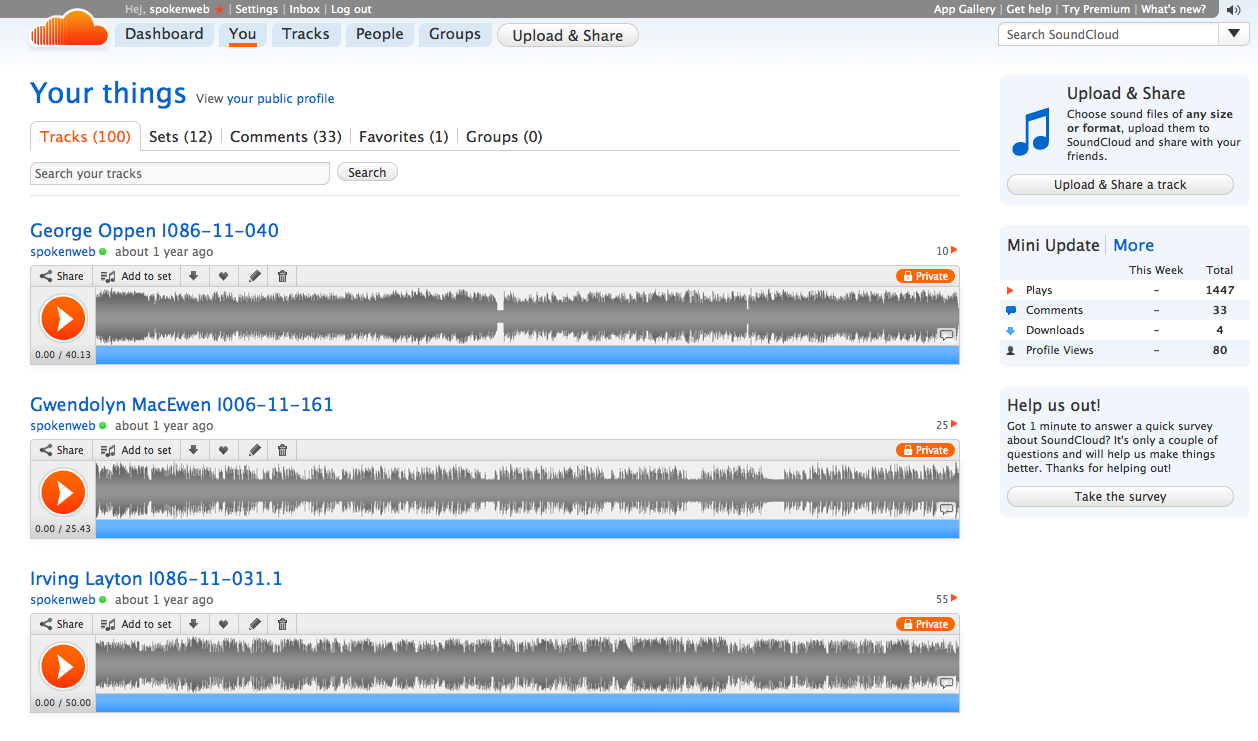Digital Toolbox
SoundCloud
| Project URL | |
|---|---|
| Logo |  |
| Site screenshot |  |
| Cost and Development Philosophy | Soundcloud charges by playback time. Up to 120 minutes is free. For more time and other features they have different pricing levels (http://soundcloud.com/premium). |
| Local Installation or Hosted Solution | Hosted |
| Description | “SoundCloud is the world’s leading social sound platform where anyone can create sounds and share them everywhere. Recording and uploading sounds to SoundCloud lets people easily share them privately with their friends or publicly to blogs, sites and social networks. SoundCloud can be accessed anywhere using the official iPhone and Android apps, as well as hundreds of creation and sharing apps built on the SoundCloud platform.” (source) |
| Use on SpokenWeb Project | We use the SoundCloud site to host the digitized audio from the SGW Poetry Reading Series. We chose SoundCloud for several reasons. First, we simply needed somewhere to store the audio that would give us relatively simple and reliable web-based access to the recordings. SoundCloud also gives you full control over how the tracks are used: you can make them public or private, available for download or not, enable or disable sharing/embedding et cetera. We’re also interested in the ability to record audio (e.g. a live poetry reading) using the SoundCloud mobile app so that the audio could be available for listening on the web within minutes of a reading. |
| Evaluation | Our experience using SoundCloud has been very good. First, we should acknowledge that they have sponsored our project with a top-level account for two years. This has been very helpful and has allowed us to experiment with the SoundCloud player in a spoken word and poetry context. There are, of course, serious questions about sustainability for any sound archive (including ours) that wants to use SoundCloud. We currently have about 100 hours of audio and therefore require the “Pro-Plus” account which runs for 500 Euros/year. In the next phase of the project we plan to investigate other options such as self-hosting and designing our own player.
Further, their technical support has been very helpful and quick to respond. We’ve have numerous development questions and have been very impressed with the detailed responses and suggestions we’ve received. Our main contact, Ben Fawkes (Audio Content Manager), has been particularly helpful.
Finally, SoundCloud has been very reliable. There have been precious few examples of downtime although it has happened. |
| Projects | So far we haven’t encountered other poetry or spoken word archives that use SoundCloud. |
| Future Directions | SoundCloud is currently putting a lot of energy into podcasts (and making them easier to distribute, “freeing them” from Apple’s closed distribution) and also developing SoundCloud into something like the audio equivalent of Twitter (i.e. making it easier for people to instantly record and publish short bursts of audio on the web).
Some examples: question and answer audio sites (also see http://takesquestions.com/), syncing your voicemail and SoundCloud accounts to enable easy publishing of audio on the web (see also http://importer.soundcloudlabs.com/), et cetera. You can also watch SoundCloud CEO Alexander Ljung’s presentation at The Next Web for more details. Finally, there are an increasing numbers of apps on the SoundCloud site that make it easy to do mobile recordings (e.g., from smartphones) that are automatically uploaded to your SoundCloud account. |
| References | http://soundcloud.com/ |